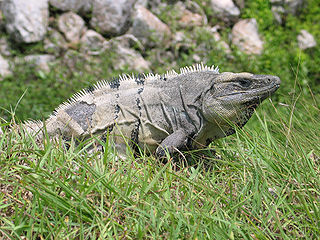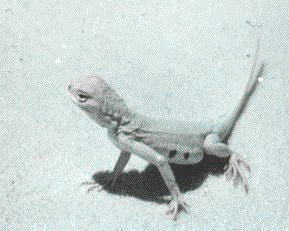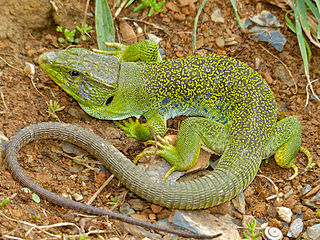
The Lacertidae are the family of the wall lizards, true lizards, or sometimes simply lacertas, which are native to Afro-Eurasia. It is a diverse family with at about 360 species in 39 genera. They represent the dominant group of reptiles found in Europe.

Calotes is a genus of lizards in the draconine clade of the family Agamidae. The genus contains 29 species. Some species are known as forest lizards, others as "bloodsuckers" due to their red heads, and yet others as garden lizards. The genus name Calotes has been derived from the Greek word Καλότης (Kalótës), meaning ‘beauty’, referring to the beautiful pattern of this genus.

The Sinai agama is an agamid lizard found in arid areas of southeastern Libya, eastern Egypt, Israel, Jordan, Syria, Saudi Arabia, Oman, eastern Sudan, Ethiopia, Eritrea, and Djibouti.

Xenagama is a genus of lizards in the family Agamidae. Species of the genus are native to Ethiopia and Somalia.

Ctenosaura is a lizard genus commonly known as spinytail iguanas or ctenosaurs. The genus is part of the large lizard family Iguanidae and is native to Mexico and Central America. The name is derived from two Greek words: κτενός, meaning "comb", and σαύρα, meaning "lizard".

Crotaphytus is a genus of lizards, commonly known as collared lizards, in the family Crotaphytidae. Member species are small to medium-sized predators indigenous to the American southwest, Baja peninsula, and Mexico. Including the tail, they can be as small as 7 in (18 cm) or as long as 14 in (36 cm), and are characterized by distinct bands of black or brown around the neck, to which their common names refer.

Leiocephalidae, also known as the curlytail lizards or curly-tailed lizards, is a family of iguanian lizards restricted to the West Indies. One of the defining features of these lizards is that their tail often curls over. They were previously regarded as members of the subfamily Leiocephalinae within the family Tropiduridae. There are presently 30 known species, all in the genus Leiocephalus.

The zebra-tailed lizard is a species of lizard in the family Phrynosomatidae. The species is native to the Southwestern United States and adjacent northwestern Mexico. There are nine recognized subspecies.

The genus Cordylus includes a wide variety of species of small to medium spiny lizards from Africa, collectively called girdle-tailed lizards or girdled lizards. All are diurnal and ovoviviparous. Most species are rupicolous (rock-dwelling), while a few species are arboreal or live in burrows. They defend themselves with osteoderms and by quickly retreating into rock crevices or burrows. Many species live in groups, and males defend territories.

Lacerta is a genus of lizards of the family Lacertidae.

Tetradactylus is a genus of lizards in the family Gerrhosauridae. The genus is endemic to Africa.

Holbrookia is a genus of earless lizards, known commonly as the lesser earless lizards, in the family Phrynosomatidae. The genus contains six recognized species, which are found throughout the Southwestern and Central United States and northern Mexico. They are characterized by having no external ear openings, presumably to prevent soil from entering their bodies when they are digging.

The ocellated lizard or jewelled lizard is a species of lizard in the family Lacertidae. The species is endemic to southwestern Europe.

Timon princeps, commonly called the Siirt lizard or the Zagrosian lizard, is a species of lizard in the family Lacertidae. The species is endemic to Western Asia.

The Madeiran wall lizard is a species of lizard in the family Lacertidae. It is the only species in the genus Teira. The species is endemic to the Madeira Archipelago, Portugal. In the Azores, this lizard has become naturalized after involuntary introduction by the shipping trade between the two archipelagos. There are four recognized subspecies.

Bosc's fringe-toed lizard or Bosk's [sic] fringe-fingered lizard is a species of lizard in the family Lacertidae. The species is endemic to North Africa and Western Asia. Three subspecies are sometimes recognised; A. boskianus boskianus, from Lower Egypt; A. boskianus euphraticus from Iraq; and A. boskianus asper from the rest of the range; however this division is unsatisfactory because each subspecies has much variation and the differences between them are not consistent.

Omanosaura cyanura, the blue-tailed lizard or blue-tailed Oman lizard, is a species of lizard in the family Lacertidae. It is found in Oman and the United Arab Emirates.

Omanosaura jayakari, also known commonly as the Jayakar lizard, Jayakar's lizard, and Jayakar's Oman lizard, is a species of lizard in the family Lacertidae. The species is native to Oman and the United Arab Emirates.

Al Hajar montane woodlands is a temperate grasslands, savannas and shrublands ecoregion in the Hajar Mountains of the eastern part of the Arabian Peninsula, which extends across portions of Oman and the U.A.E.

Arabian toad-headed agama is a species of agamid lizard found in Saudi Arabia, Qatar, United Arab Emirates, Oman, Iran, and Jordan.




















